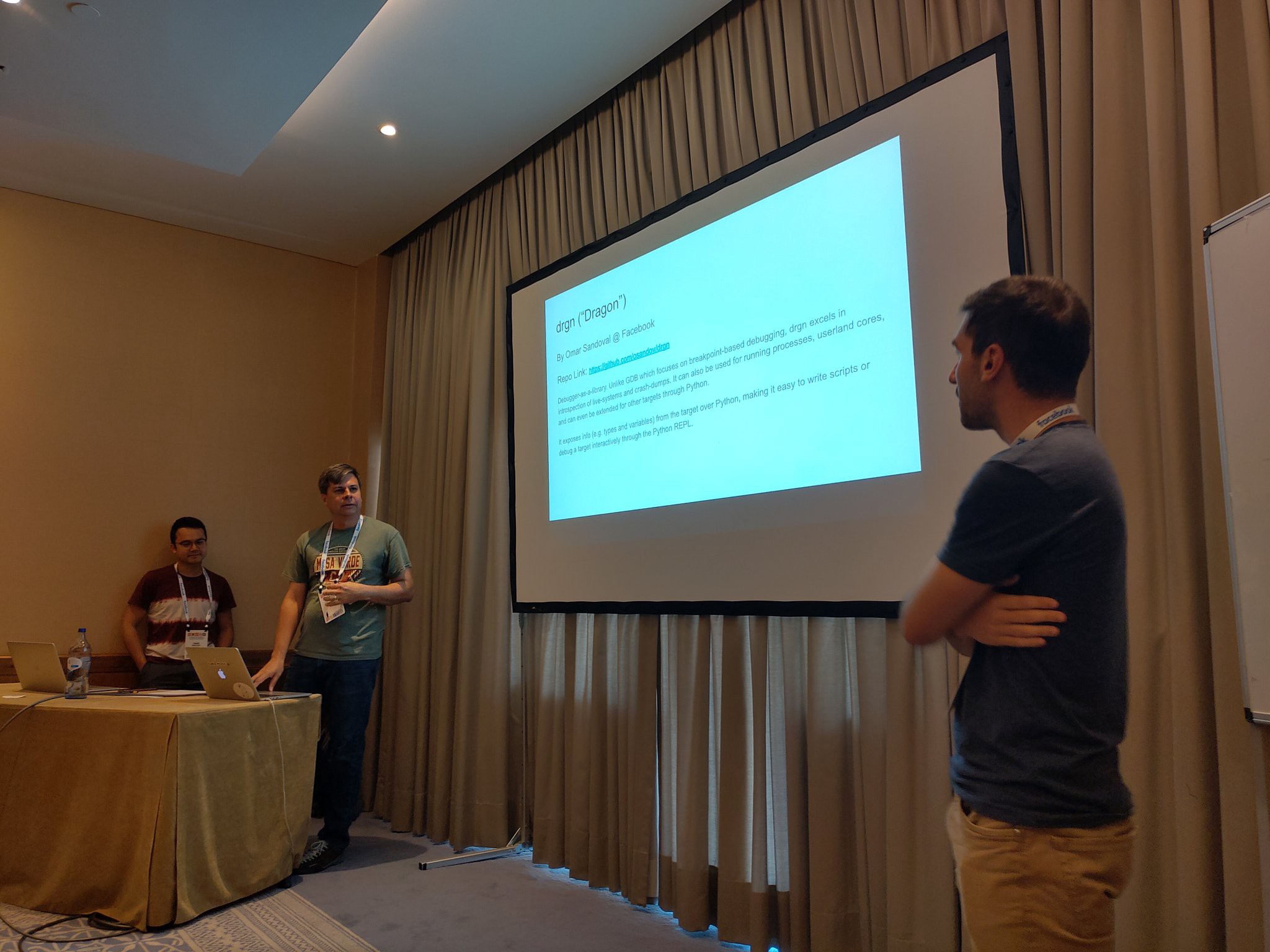Since the time I joined Delphix, it feels like I’ve always had at least one side-project that’s debugger-related. As we were based on illumos initially, most of these projects were around MDB. Some of those were polished and made it upstream (e.g. smart-write and support for incomplete unions in CTF) while others remained in the prototype stage in my home directory (support for Java, Lua scripting capabilities, etc..). Transitioning to Linux, a debugger that supported our existing processes and use cases was a big question mark in our plan. At this time, a bit over a year ago, I made replacing that question mark my side-project and with the support of the whole Systems Platforms team within Delphix in both resources and technical contributions, I think we finally have a solid plan.
After surveying existing solutions (gdb, kgdb/kdb, crash, and
crash-python), considering porting tools from other platforms (mdb and
acid), and even creating our own debugger from scratch, we decided on
creating sdb — a solution that combined all of the above. SDB is a debugger
very similar to MDB, written from scratch in Python, and it leverages most of
its capabilities from drgn, which in turn depends on common Linux libraries
like libelf and libdwfl. The debugger itself is far from being done, yet I
believe it’s at a stage now that anybody can give it a spin and even try it in
production. In addition, while examining all of the above options, we got to
create contacts and bring a few people together in a group to discuss the
current issues and the future direction of kernel debugging tools in Linux. If
you are interested, feel free to subscribe to our mailing
list,
slack workspace, or email me to
receive an invite for one of our upcoming monthly meetings.
In retrospect the highlights of the year for the project have been the following in chronological order:
-
April 8th - All potential options with detailed plans and their requirements are put on the table.
-
May 2nd - Prakash Surya and I hacked together the initial prototype of sdb on top of crash-python.
-
May 6th - The whole Systems Platforms team had a work-week hacking on sdb. The results were: SDB Pipes by Matt Ahrens and Paul Dagnelie, blkptr by Don Brady, zfs_dbgmsg by Paul, stacks by Sara Hartse and John Gallagher, arcstat by Prashanth Sreenivasa, and spa/vdev by George Wilson. In addition, Tom Caputi and Prakash enabled crash-python to work for live-systems (a solution that we still use today while support for function arguments insdb on top of drgn is still a WIP). Finally, Pavel Zakharov drew the first and only picture of the SDB mascot to this date.
sdb> spa -v
ADDR NAME
------------------------------------------------------------
0xffffa0894e720000 data
ADDR STATE AUX DESCRIPTION
------------------------------------------------------------
0xffffa089486fc000 HEALTHY NONE root
0xffffa08949ff4000 HEALTHY NONE mirror
0xffffa08948af8000 HEALTHY NONE /dev/sdb1
0xffffa08949ff8000 HEALTHY NONE /dev/sdc1
0xffffa08949e58000 HEALTHY NONE /dev/sdd1
0xffffa08955c44000 rpool
ADDR STATE AUX DESCRIPTION
------------------------------------------------------------
0xffffa08952efc000 HEALTHY NONE root
0xffffa08953300000 HEALTHY NONE /dev/sda1
sdb> stacks
THREAD STATE COUNT
---------------------------------------------
560 INTERRUPTABLE 14
context_switch+0x108
__schedule+0x2c0
schedule+0x2c
schedule_hrtimeout_range_clock+0x181
schedule_hrtimeout_range+0x13
poll_schedule_timeout+0x46
do_poll+0x2b6
do_sys_poll+0x3d6
__do_sys_poll+0x10
__se_sys_poll+0x2b
__x64_sys_poll+0x3b
do_syscall_64+0x5a
entry_SYSCALL_64
...
1 RUNNING 1
context_switch+0x108
__schedule+0x2c0
schedule_idle+0x22
do_idle+0x16c
cpu_startup_entry+0x1d
rest_init+0xae
arch_call_rest_init+0xe
start_kernel+0x4f5
x86_64_start_reservations+0x24
x86_64_start_kernel+0x74
secondary_startup_64
Total unique stacks: 114
Matching unique stacks: 114

-
May 19th - Creation of
sdbprototype on top ofdrgn. -
June 23rd - Prakash finished single-handedly porting the majority of the crash-python based code to the new prototype based on
drgn. -
June 25th - With the help of Karyn Ritter we were able to open-source sdb under the Apache License 2.0.
-
June 26th - The first Linux Kernel Debugging Community meeting took place online through Zoom where people from multiple companies, including the creators of
crash-python(Jeff Mahoney) anddrgn(Omar Sandoval), got to discuss the current issues and status of the existing debugging tools. -
September 9th - The Linux Plumbers Conference of 2019 took place in Lisbon. Omar presented DRGN in the tracing track while George Wilson and I introduced SDB in a BoF. Unfortunately BoFs are not recorded so there is no video of our presentation.

- November 4th - The OpenZFS Dev Summit of 2019 took place in San Francisco. I presented SDB there in the context of debugging ZFS on Linux. A few people decided to work on SDB during the hackathon with two of them ending up being in the finalists. Sara Hartse got 2nd place with her SDB walker for B-Trees in ZFS and Jordan Hendricks in the 3rd place with her metadata pretty-printer for kernel mutexes.
- December 11th - SDB reaches an important stability and usability milestone (at least for me personally). We have a new test-suite that is not based on mocks which enables us to thoroughly tests all of our commands, code coverage statistics, and preliminary type-checks through mypy. All of these are fully automated and extensible through Github actions brought to you by Prakash. On the usability side, a ton of bugs were filled and fixed by Matt, Prakash, and Chuck Tuffli. Highlights include: Coercing correctly at every point within a pipeline, auto-generating help messages from comments in the source, and maintaining the SDB session when dealing with buggy commands or Ctrl+c.
There is still a ton of work to be done on SDB and I’m excited to see what we do next.